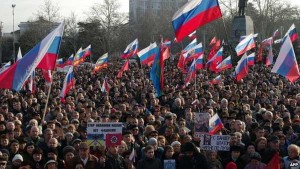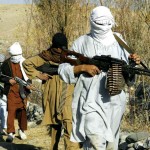The Crimean crisis was an international crisis in 2014 principally involving Russia and Ukraine over the control of the Crimean Peninsula, until its annexation by Russia. Crimea is populated by an ethnic Russian majority and a minority of both ethnic Ukrainians and Crimean Tatars. Prior to the crisis, Crimea comprised Ukraine’s Autonomous Republic of Crimea and the administratively separate municipality of Sevastopol. The Russian Federation has organized them as the Crimean Federal District.
Russia accused the United States and EU of funding and directing the ouster of Yanukovych, maintaining he was illegally impeached and remained the president of Ukraine.
The crisis unfolded in the aftermath of the Ukrainian Revolution. On 21st February 2014 President Viktor Yanukovych fled Kiev, the capital. The Ukrainian parliament deposed him the next day, and the next week appointed an interim President, Aleksandra Turchynov, and formed an interim government. The new government was recognized by the United States and European Union. Russia and a few other countries condemned the Turchynov government as illegitimate and the result of a coup d’état. Russia accused the United States and EU of funding and directing the ouster of Yanukovych, maintaining he was illegally impeached and remained the president of Ukraine. Beginning on February 26, pro-Russian forces began to gradually take control of the Crimean peninsula. Media sources reported that military personnel in Russian-made uniform without insignia, and former members of the Ukraine military were involved. While these troops were in Crimea, the Crimean parliament voted to dismiss the Crimean government, replace its Prime Minister, and call a referendum on Crimea’s autonomy.
A referendum on whether to join Russia, held shortly after takeover of the Supreme Council of Crimea, had an official turnout of 83% and officially resulted in a 96.77% (Crimea) and 95.6% (Sevastopol) affirmative vote, but was condemned by the EU, the US, Ukraine and the representatives of the Crimean Tatar as violating Ukraine’s constitution and international law. On March 17, the Crimean Parliament declared independence from Ukraine and asked to join the Russian Federation. On March 18, Russia and the separatist government of Crimea signed a treaty of accession of the Republic of Crimea and Sevastopol into the Russian Federation. On March 27, the UN General Assembly passed a non-binding Resolution 68/262 that declared the Crimean referendum invalid and the incorporation of Crimea into Russia illegal. On April 15, the Ukrainian parliament declared Crimea a territory temporarily occupied by Russia.
History
On February 23 in Sevastopol, tens of thousands protested against the new authorities and voted to establish a parallel administration and civil defence squads created with the support of Russian Night Wolves bikers. Same were created on February 22 in Simferopol, where about 5,000 had joined such squads. Protesters waved Russian flags and chanted “Putin is our president” and claimed they would refuse to pay further taxes to the state. On the morning of 27 February, Berkut units from Crimea and other regions of Ukraine (dissolved by the decree of 25 February) seized checkpoints on the Isthmus of Perekop and Chonhar peninsula. According to Ukrainian MP Hennadiy Moskal, former Chief of Crimean police, they had armoured personnel carriers, grenade launchers, assault rifles, machine guns and other weapons. Since then they have controlled all land traffic between Crimea and continental Ukraine.
There has been a range of international reactions to the crisis. A U.N. General Assembly passed a non-binding resolution 100 in favour, 11 against and 58 abstentions in the 193-nation assembly that declared invalid Crimea’s Moscow- backed referendum.
Also on the early morning of 27th February, armed men in Simferopol, the capital city of the Autonomous Republic of Crimea, seized the Crimean parliamentary building and the Council of Ministers building and replaced the Ukrainian flag with the Russian flag. They ousted the prime minister appointed by the President of Ukraine and installed a pro-Russian politician, Sergey Kasyanov, as Crimea’s prime minister.
Reactions in Ukraine
Three ex‐presidents of Ukraine accused Russia of interfering in Crimean affairs. Interim president Oleksandr Turchynov at the start of the protests warned that there is a “serious risk” of separatism in parts of the country. On February 27th, 2014, the Central Election Commission of Ukraine claimed that regional referendum is impossible due to lack of necessary legislative basis for such. On February 27, 2014, the Chairman of the Verkhovna Rada Oleksandr Turchynov was instructed to develop a new law “about language”. On February 28, a freelance journalist wrote on Twitter that President Yanukovych said that any military actions are unacceptable and he will not ask Russia for it. According to President Yanukovych he believed that Crimea must remain part of Ukraine. The new Prime Minister of Ukraine Arseniy Yatsenyuk stated in his maiden speech on February 27 that “Ukraine will use all legal constitutional methods to preserve the territorial integrity of the state. Crimea was, is and will be a part of Ukraine.
Reactions in Crimea
The Ukrainians in Crimea called on Ukrainian officials to secure peace and security for Crimean’s and for European officials to influence the Russian position in regards to separatist attitudes. The new chairman of the Council of Ministers hopes to receive financial help from the Russian Federation with support from Viktor Yanukovych.
International Reactions
There has been a range of international reactions to the crisis. A U.N. General Assembly passed a non-binding resolution 100 in favour, 11 against and 58 abstentions in the 193-nation assembly that declared invalid Crimea’s Moscow- backed referendum. In a move supported by the Lithuanian President, the United States government imposed sanctions against persons they deem to have violated or assisted in the violation of Ukraine’s sovereignty. The European Union suspended talks with Russia on economic and visa related matters; and is considering more stringent sanctions against Russia in the near future, including asset freezes. Japan announced sanctions which include suspension of talks relating to military, space, investment, and visa requirements. The EU Commission decided on March 11 to enter into a full free-trade agreement with Ukraine this year. On March 12, the European Parliament rejected the upcoming referendum on independence in Crimea, which they saw as manipulated and contrary to international and Ukrainian law.
…the referendum seems inconsistent with the Ukrainian constitution, which says all Ukrainians would have to vote on Crimea’s secession – not just those living in Crimea.
The G7 bloc of developed nations (the G8 minus Russia) made a joint statement condemning Russia and announced that they will suspend preparations for the upcoming G8 summit in Sochi in June. NATO condemned Russia’s military escalation in Crimea and stated that it was breach of international law while the Council of Europe expressed its full support for the territorial integrity and national unity of Ukraine. The Visegrád Group has issued a joint statement urging Russia to respect Ukraine’s territorial integrity and for Ukraine to take into account its minority groups to not further break fragile relations. It has urged for Russia to respect Ukrainian and international law and in line with the provisions of the 1994 Budapest Memorandum.
Legality of the Crimean Referendum
At first, Russia’s argument about Crimea sounds a bit convincing: the best way to decide whether Crimea should remain part of Ukraine or instead secede and become part of Russia is by holding a referendum to let the people of Crimea decide. On second thought, though, that creates major problems ahead of Sunday’s scheduled vote: what if the presence of Russian troops intimidates voters, so the process is not ―free and fair? What about the possibility that Russia is bussing in large numbers of native Russians to stack the deck? Then there’s the bigger problem: the referendum seems inconsistent with the Ukrainian constitution, which says all Ukrainians would have to vote on Crimea’s secession – not just those living in Crimea.
These logical defects in the Russian proposal are obvious, and Secretary of State John Kerry no doubt brought them up during his meeting with Russian Foreign Minister Sergey Lavrov in London today. But the real difficulty heading into this pivotal weekend for the crisis is more fundamental: the Russian proposal is based on an outdated theory of secession. Once upon a time, the right to secede was analyzed in terms of nationalist, linguistic, ethnic or religious homogeneity. Woodrow Wilson, for example, proposed redrawing the boundary lines in Europe to preserve the integrity of nationalist groups – Poland for the Polish, Serbia for the Serbians, and (now) Crimea for the Crimean’s. This was thought to be the best way to promote self-determination and, therefore, democracy. If this is right, then all people living in Crimea should ideally vote to decide what to do. By this logic, the self-determination principle is the central consideration, and other problems – like intimidation – are just practical problems.
Does no one remember the former Yugoslavia? Using principles of self- determination to justify imposing ethnic homogeneity has resulted in genocide and ethnic cleansing. This brand of nationalism carried to its logical conclusion is ugly, plain and simple.
If a referendum were the right way to decide these issues, Russia ought to be holding a referendum to determine the future of Chechnya. Of course, it isn’t. International law is unambiguous on how countries should decide the fate of disputed territories like Crimea.
Arguments about ethnicity also overlook the central question: who owns the territory that constitutes Crimea? The answer is unambiguous: the Ukraine does. If people living in Crimea want to be Russian citizens, they can move to Russia – and that’s the right recourse. By voting for annexation to Russia, these would-be Russians are actually trying to take the territory away from Ukraine to give it to Russia. Their objective – and, of course, Russia’s, too – is not just to make these people Russian citizens but to take Ukrainian land, and it cannot be justified by a referendum about the preferences of those who live in Crimea today.
It’s a matter of international law: territory cannot be annexed simply because the people who happen to be living there today want to secede. If that were the case, then under international law, any geographically cohesive group could vote on independence. That would mean the Basques should be free from Spain and France, and the Kurds would have an independent nation; the large community of Cubans living in Miami could vote to separate from the United States.
If a referendum were the right way to decide these issues, Russia ought to be holding a referendum to determine the future of Chechnya. Of course, it isn’t. International law is unambiguous on how countries should decide the fate of disputed territories like Crimea. Countries can acquire territory by discovering uninhabited land, signing a treaty – as with Khrushchev’s transfer of Crimea to Ukraine in 1954 – or occupying an area peacefully over a long period of time. The legal methods for resolving questions of sovereignty are founded on widely recognized principles of international law. These do not include, and have never included, a simple referendum of people living in a contested territory. That is why every successful secessionist movement has founded its claim on legal entitlement to the territory that they seek to ―liberate. Thus the Baltic States argued that they were illegally conquered by the Soviet Union; Tibet says the same about China; and Eritreans fought for decades to reverse their illegal annexation by Ethiopia.
What makes a secessionist claim successful in the eyes of the international community – indeed, in the eyes of the people fighting for secession – is the existence of a historical grievance over territory. No such legal claim can be made surrounding Crimea.





